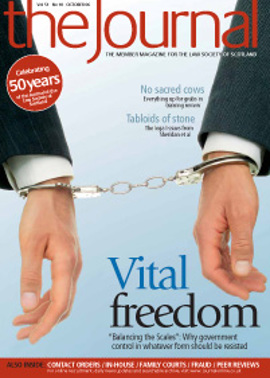Channels of communication

The Minister for Justice, Cathy Jamieson, was correct when she told the Scottish Parliament that the Scottish Executive had shared some “robust exchanges” with the Society over the contents of the Legal Profession and Legal Aid (Scotland) Bill. Rightly so. We have argued for months that the bill is flawed, and were determined to make our concerns clear to the Executive. However it was also true, as the Minister indicated, that the Society provided a valuable role in passing on the views of those who had something to contribute. I would add that the same goes for the large volume of solicitors and clients who also made their concerns about the bill clear to MSPs before the stage 1 debate on the bill.
David Davidson, the chairman of the Justice 2 Committee – which scrutinised the bill – pointed out that the bill “requires a significant amount of work to bring it up to the standard that the Parliament expects”. From the outset the Society has stated that the bill can only be justified if it brings about genuine improvement for both the profession and the public alike. It seems that viewpoint may now be attracting the recognition it deserves, not least because it emerged that the Executive intends to bring forward 300 or so amendments to the legislation.
Indeed, ministers announced details of some key amendments – relating to the appointment, tenure and removal of members of the Scottish Legal Complaints Commission as well as its decision-making powers – the day after the Society held its “Balancing the Scales of Justice” conference on the independence of the legal profession. There was certainly a passionate debate at the conference, including valuable input from consumer bodies and charity representatives. Likewise, the contributions of those from other jurisdictions provided interesting, external perspectives on a Scottish issue.
However, whilst the conference may have provoked an encouraging ministerial response, we note with some concern that the Executive has since tabled amendments, which may have major consequences, without any prior consultation with the Society or the Scottish Parliament’s Justice 2 Committee. The process of introducing amendments continues and we continue to monitor and comment on the amendments, promote the Society’s amendments and keep the profession informed of developments.
I was delighted to be asked by one of the larger Scottish firms to speak to them on the subject of the bill and also on alternative business structures, or ABS. The “Balancing the Scales of Justice” conference heard the clear concern from overseas bars that ABS are likely to compromise the integrity, ethics and other principles of the legal profession, as well as its special constitutional position, and it is clear from some of the leading London firms that they are unlikely to become ABS because of this international opposition.
The increase in the practising certificate for next year was agreed at a Special General Meeting at the end of September. The proposed rise had already been flagged up at the Society’s AGM and there was an acceptance at the SGM that there was a requirement to fund the Society’s pension scheme, and building works to meet health and safety and similar legislation. Members at the SGM also provided some thought-provoking feedback for the Society to consider. For instance, it was pointed out that the meeting itself was a luxury which will not exist when it comes to the funding of the new Complaints Commission, as there will be no formal mechanism for consulting with solicitors over its costs. A number of those present requested a review of the Society’s pension scheme and also highlighted the need for more effective communication with the profession. As I have mentioned before, this is one of the aims of my presidency and something the Society continues to regard as a priority.
Continuing the theme of communication, the Society is about to launch the biggest consultation it has ever undertaken. The exercise will cover every key stage of education and training, from undergraduate degrees to continuing professional development – CPD. The aim is to gather views on how best to structure the future system of legal education and training for the solicitors of today and tomorrow. It is crucial that the views of solicitors are well represented – I urge everyone with an interest to get involved.
In this issue
- TUPE passes the buck (1)
- Survival of the fittest? A reply
- Channels of communication
- Time to discard the PIPs
- Speaking in the public interest
- Education's Big Bang
- If you can't say anything nice...
- Lesbian families, parenthood and contact
- Keep it in the family
- End of the peer show
- New chambers challenges Faculty Services
- Cash without borders
- Fraud - the threat from within
- Note it down - or lose out
- Balancing privacy and data sharing
- Provoking argument
- To amend or not to amend?
- Purchases under test
- TUPE passes the buck
- Scottish Solicitors' Discipline Tribunal
- Website reviews
- Book reviews
- Law or regulation? The blurring gets more blurred
- Registers success with direct debit






